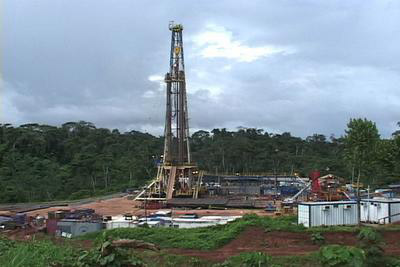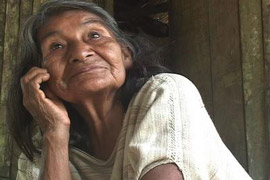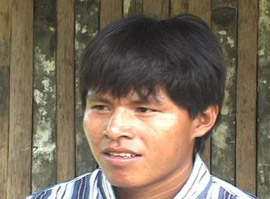The Politics of Petroleum
Air Date: Week of August 1, 2003
"WORLDS OF DIFFERENCE” PERU GAS: A giant gas drilling project in the Peruvian Amazon was supposed to set a standard for environmental and cultural responsibility. But it lies in an indigenous area and since work began, it's raised questions. Part of a new series "Worlds of Difference" from independent producer Sandy Tolan and Homelands Productions.
Transcript
CURWOOD: It’s Living on Earth. I’m Steve Curwood.
Long ago, in the hot, moist folds of the Amazon, people walked and walked to keep the sun from setting. According to Peruvian writer Mario Vargas Llosa, the Machiguenga Indians believed that if they stopped walking, the sun would fall from the sky. Then missionaries came, with other beliefs.
Soon after, settlers arrived to Machiguenga territory. Today, businessmen, tell the Machiguenga about a new kind of sun - a source of energy below ground - to be transformed into power and money. For energy companies, the vast natural gas deposits on Indian land at Camisea represent energy independence for Peru and major exports to the U.S., where demand for gas is rising. For the ten thousand Machiguenga, it means change, the unknown. Now, this story, part of "Worlds of Difference," a series on global cultural change. It is reported by Jason Felch, Chris Raphael and Sandy Tolan, who narrates the story.

Energy companies hope that by 2004, the San Martin 1 rig will begin pumping gas
into a pipeline that travels 400 miles to Lima’s coast.
(Photo: Chris Raphael)
[SOUNDS OF JUNGLE, RIVER]
TOLAN: We move slowly, down river, in the thin light of crescent moon. Three of us North Americans, with three Machiguenga guides, in a long wooden boat powered by 55 horses in the back. We edge along the eddies of a small amazon tributary, looking to the shore for our place to land. Flashlights blink out at us like fireflies.
[SOUNDS OF WATER, BOAT ENGINE]
TOLAN: This is the edge of the new El Dorado, called Camisea. Beneath us lie trillions of cubic feet of natural gas. It’s said this will light up Peru, that this nation will use its Amazon to become an energy powerhouse, and that what’s left over will be turned into liquid and sent by ship to help power gas-hungry California.
[SOUND OF BIRDS]
MARIA: (Speaking Machiguenga) They say that there, under the ground, there is light that illuminates, but I’ve never seen it.
TOLAN: Morning now, in a Machiguenga village directly above the vast deposit of gas. An old woman sits cross-legged on a wooden porch.
MARIA: (Speaking Machiguenga) I don’t know what this gas is. Is it over there, or is it up above? Where might it be? I don’t know.
 While young Machiguenga are hopeful that the Camisea project will bring wealth to their communities, elders such as Teresa Provencia maria remain skeptical. (Photo: Jason Felch) While young Machiguenga are hopeful that the Camisea project will bring wealth to their communities, elders such as Teresa Provencia maria remain skeptical. (Photo: Jason Felch) |
TOLAN: Teresa Provencia Maria covers her face with her hand, smiling shyly and looking up at us from her work. She twirls a spool of cotton from her field, pulling out the single white strand to knit a traditional shirt called a cuchma.
MARIA: (Speaking Machiguenga) I think in the future, when I no longer exist, there will be hard changes. Now I hear noises in the mountains. What might it be? I don’t know. TOLAN: The noises, and the changes, come from the men who dig under the ground. Mrs. Maria knows about these men, because her grandson works for them – a boat ride away, at Camisea, where the gas will emerge from the belly of the earth. MARIA: (Speaking Machiguenga) My grandson already has another way of being. He’s educated, he generates income. But me, I can’t read. I don’t know what money is. TOLAN: The reporters ask the old woman: so, do you think this is a good thing, this gas project? What do I know? she asks. I have one foot in the grave. I see that the animals have run away, from all the noises. But my grandson has work. Go ask him. [BLARING CUMBIA MUSIC] TOLAN: Fifty yards away, outside his one-room shack, Mrs. Maria’s grandson lies back in his hammock. It’s a day off for Wilfredo Marvaredi Vargas, who does maintenance for the consortium of gas companies. MARVAREDI: (Speaking Machiguenga) I’m happy with the job I have. I don’t want to be lazing around the community. When I’m at home, I’m losing time. I like to work. I have something to earn. I can buy the things I need. TOLAN: Things, like the stereo in his room, hooked up to a car battery. Things, like money, which helps him court a Machiguenga woman in a village down river. MARVAREDI: (Speaking Machiguenga) We could be equal to the settlers. They have comforts, they have light. Now that the companies are here, we need to take advantage to improve our houses, to assimilate ourselves into society. [SONGS ON THE RADIO] TOLAN: Between Wilfredo Marvaredi and his grandmother: hope for progress, and fear of irreversible change. Mr. Marvaredi tells us he agrees with his grandmother that the animals are fleeing the noise from the machines. All along the river now, there are fewer animals and fish to eat. And many people here remember the 1980s, when gas workers first came to the area and nearly half of the tiny Nahua tribe was reportedly wiped out by epidemic disease. Wilfredo wonders about the price of gas. [TRAFFIC SOUNDS] TOLAN: But if you follow the gas, by pipeline out of the Amazon, across the frigid Andes, and down to the hazy capital of Lima, you will find officials who promise Wilfredo Marviredi and his grandmother need not worry. DEL SOLAR: We have done everything by the book, following World Bank standards in the way we treat the environment. TOLAN: Carlos Del Solar of Texas-based Hunt Oil, the lead company among seven that will ship liquefied Amazon Gas up the Pacific, toward California. DEL SOLAR: You cut a tree, you have to plant another tree. And what you see is a very professional handling of the environmental and also the relations with the communities, preserving their heritage, their customs. TOLAN: Royal Dutch Shell once held the Camisea contract. Hammered by disastrous PR after oil-rich Nigeria executed the activist Ken Sarowiwa, Shell promised to make Camisea its model rainforest project. The company promised to leave scarcely a footprint on the floor of the Amazon, but Shell pulled out a few years ago amid questions about the market for gas. People close to the project also say Peru's Fujimori administration was trying to extract bribes. Now demand is up again, both for export to the U.S. and in Peru. Officials in a new government say they’ll convert Lima buses, taxis and factories to run on cleaner natural gas. And the companies that took Shell’s place say they, too, will treat the rainforest with respect, and help the people modernize. DEL SOLAR: But also giving them the opportunity to form part of the civilized communities, in order to integrate themselves to the community. Join the modern world. By working, being trained, being educated. [SOUND OF RIVER] TOLAN: Back in the Amazon, in the Machiguenga Villages along the Urubamba River, many people see their choices in much the same way as Wilfredo Marvaredi and his grandmother: to aspire, and get on board, or to remain wary, and simply watch. [SOUSNDS OF WATER, FROG CALLS] TOLAN: We’ve come to Shima’a, a village of muddy paths snaking through thatch huts, coconut palms, bananas and a living pharmacy of plants. To the south, a yellow halo behind a hill: the gas workers camp. VICENTE: (Speaking Spanish) Work began. And it is no longer like it was. TOLAN: Village elder Pedro Vicente sits in a folding chair. He remembers Shell and its promises of a model project, but he says these new companies are not following through. Company officials point out they’ve installed new drinking water taps in part of the village. And they paid $170,000 to the community as compensation for putting the pipeline through here. This hasn’t pacified Pedro Vicente. VICENTE: (Speaking Spanish) We can’t live calmly now. The land, the trees are destroyed. There is change now, a transformation. TOLAN: The next morning, we can see the transformation, laid bare on a hillside where the pipeline crosses. Alongside a vertical path, a hundred feet wide, lie hundreds of mud-coated trees, strewn wildly like so many toothpicks. Villagers say after the trees were cut, a landslide thundered down and buried an empty house, polluting a major source of the village drinking water. Machiguenga activist Walter Kategari stands in the pounding sun, surveying the damage from above. KATEGARI: Now the companies with their community relations people always say with the best technology they will remediate the impacts, but it doesn’t work. We have seen the erosion here. We always say, they never do what they promise. [SOUND OF HELICOPTER] TOLAN: Within minutes, a helicopter approaches us as we walk down from the pipeline route and onto the village soccer field. Suddenly we realize the chopper is [VOICES IN SPANISH] TOLAN: Two pipeline workers emerge to scold us: we needed written permission, plus hard hats and long sleeves, to be walking that pipeline route. [HELICOPTER NOISES] TOLAN: Walter tells them, your people treat us like we Machiguenga are just in your way. [SOUNDS OF CONVERSATION] TOLAN: No, no, the pipeline workers say. We’re here because we are concerned about safety. They repeat: you didn’t have permission to walk along the pipeline. The reporters ask the representatives: but, did you have permission to land unannounced in this village? No, they admit. [SOUND OF HELICOPTER] TOLAN: The workers board the chopper again, and leave. Walter starts to laugh. [LAUGHTER] TOLAN: Walter says they don’t really care about security. They’re worried that reporters saw the erosion and landslide. And, he says, the Machiguenga accept cultural change; they just want a say in how it’s done. KATEGARI: (Speaking Spanish) Modernization, development, access to a better life. That doesn’t mean a town has to be destroyed. A culture always alongside modernization. They have to go together. TOLAN: The workers and their machines are here now, but soon, they’ll be gone. Meanwhile, the Machiguenga will have had a taste of modern life. For some, the long term worry is dependence. A company anthropologist told us the villagers see the gas operation as the big papa. The attitude, he says, is while the company is here, let’s get what we can. The companies say payments to a village like Shima’a was understood as an exchange for a right of way to pass through here, a sharing of natural wealth. Now it seems, villagers increasingly see the money as simply compensation for damages. [VOICES, WATERFALL] TOLAN: We move down river from Shima’a, across the great rapid known as the Pongo de Manique, where it’s said the souls of the Machiguenga go when they die; where they say it rains every time a gringo passes through here. And it did. Back in the lower Urubamba, moving again toward the source of the natural wealth, we learn that the worry over damages is growing. MALE: (Speaking Spanish): This was the 15th of May 2002. The spill went all the way to Urubamba. And there was another one on the 17th. And the 20th of May. And the 20th of July. TOLAN: A young man stands in a boat tied to the shore below his village of Chocoriari. He works for the pipeline company – one of five witnesses who told us of a total of six diesel spills from storage tanks used to run heavy equipment. All the spills reportedly ran into the Urubamba. He recounts the first spill: MALE: (Speaking Spanish) It was during the night. There where special sponges to suck it all up, special ones. We all suffered as well. Petroleum burns. The skin peeled off our hands. TOLAN: In each case, he tells us, giant black rubber bladders burst. Each contained 4000 gallons of diesel. Now, the man tells us, there are no fish worth eating and less protein for the village. Now another man steps forward, claiming the company told him to stay quiet after he witnessed a spill. MALE 2: (Speaking Spanish) They told me: You as a peon, as a worker for this company, don’t tell the community what has happened. But, my children, for my family and the future of our community, we are all hurt by this. They say if I talk about this, they will fire me. But I don’t care. TOLAN: Company workers on the river would not answer the reporters‚ questions. Via email from Lima, an official acknowledged some spills, but said they were contained. [SOUND OF HACKING THROUGH BRUSH] TOLAN: Our last stop is the headquarters for the Camisea drilling operation, a large square of gravel and trailers housing petroleum workers from around Peru and the world. There, in a gully near the bank of the Urubamba is young Wilfredo Marvaredi, in his orange jumpsuit, hacking away at brush with his machete. His grandmother may not understand how light can come from under the ground. Mr. Marvaredi says he doesn’t either, but he does know that money comes from there. And he’s working for that, as fast as he can.  Wilfredo believes that Camisea could bring light to villages such as Segakiato, but he also suspects the project has harmed the environment. (Photo: Chris Raphael) Wilfredo believes that Camisea could bring light to villages such as Segakiato, but he also suspects the project has harmed the environment. (Photo: Chris Raphael)
TOLAN: Soon, the wells with be drilled, most personnel will Leave, and Wilfredo Marvaredi may not have any more work. If that happens, he says, he’ll get married, grow yucca and banana, and be by his grandmother’s side. MARVAREDI: I’m very close to my grandma, I cannot go somewhere else. But I couldn’t live like she lived before. It’s different. I’m educated. I need to know how to live in a house, not like she did before, in the headwaters of the rivers. [SOUND OF HACKING BRUSH] TOLAN: For Living on Earth, with Jason Felch and Chris Raphael, this is Sandy Tolan reporting. [MUSIC: Ry Cooder and Manuel Galbon “Secret Love” Mambo Sinuedo 2003] CURWOOD: Our story on natural gas development in the Peruvian Amazon was made possible, in part, with funds from the Corporation for Public Broadcasting and the Rockefeller Foundation. Production assistance from Ellen Yuan. "Worlds of Difference" is a project of Homelands Productions. For more information, visit our website at livingonearth.org. Links
|





